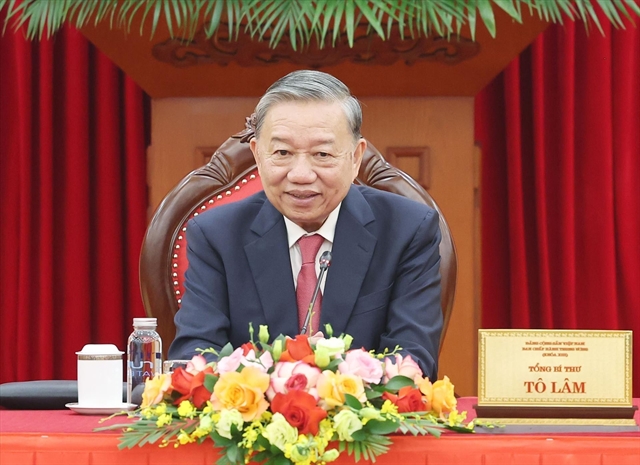 Politics & Law
Politics & Law

 |
| National Assembly Chairman Trần Thanh Mẫn (centre) during discussions on the draft law amending and supplementing certain provisions of the Law on Education on Wednesday in Hà Nội. VNA/VNS Photo Doãn Tấn |
HÀ NỘI — National Assembly (NA) Chairman Trần Thanh Mẫn has underscored the need to enhance decentralisation and delegation of authority in education management.
The decentralisation and delegation of authority should be in line with the Party General Secretary’s directive that “localities decide, act and take responsibility”, while central agencies, the NA and the Government focus on creating a good environment to enable development.
Speaking on Wednesday morning at the 48th session of the NA Standing Committee, during discussions on the draft law amending and supplementing certain provisions of the Law on Education, Mẫn added that the revisions must centre on strengthening decentralisation.
He also said it needs to clearly define the scope of education management at provincial and commune levels to ensure decisions are made and implemented locally, with full accountability.
Central agencies, he said, should focus on enabling development, while policies must ensure fairness in access to education and facilitate connectivity within the education system.
The streaming of students into different levels of education must be aligned with labour market demands.
Education groups should also encourage contributions from various sectors while maintaining State oversight.
Mẫn stressed the close links between the Law on Education, the amended Law on Higher Education and the amended Law on Vocational Education, all of which must reflect the spirit of the four pillars outlined in Resolutions 57-NQ/TW, 59-NQ/TW, 66-NQ/TW and 68-NQ/TW, along with the draft resolution on modernising and advancing education and training.
He also pointed out that with many new education support policies coming into effect in the next academic year, localities must ensure that all school-age children are enrolled, leaving no one behind.
Textbooks must be reviewed for scientific accuracy, cost efficiency and suitability to actual conditions, and lingering difficulties in their implementation at the local level should be addressed, the Government leader said.
Also at the meeting, NA Deputy Chairman Nguyễn Khắc Định stressed that the Law on Education serves as a foundational framework for the education system, attracting significant public attention and expectations.
The Government’s report should therefore place greater emphasis on the political, legal and practical imperatives for amending the law, underlining the role of education and training in implementing the four pillars.
As for national high school graduation exams, Định said he supported the proposal to maintain the examinations, with the Minister of Education and Training retaining the authority to set the exam papers while local authorities organise the exams.
He said that graduation exams are now clearly separated from university entrance exams, with universities free to use the results for admissions or to hold their own tests, including additional aptitude or public speaking assessments.
Open, practical education
In a previous presentation of the draft law's key points, Minister of Education and Training Nguyễn Kim Sơn said the amendments aim to improve the legal framework for building an open Vietnamese education system that is practical, vocationally oriented and committed to quality teaching, learning and management.
The reforms seek to ensure a well-structured, appropriately delivered system connected to lifelong learning with international integration, while preserving its socialist orientation and national identity.
The draft also aims to abolish at least 30 per cent of unnecessary business investment conditions and 30 per cent of administrative compliance costs, making it easier for individuals, organisations and institutions to access and carry out education-related administrative procedures.
It promotes decentralisation and delegation to enhance governance efficiency across the system.
The proposed amendments cover the national education system, education institutions and teachers, State management of education and the rights and responsibilities of stakeholders.
They apply to the entire national education system and strengthen decentralisation in State management, granting greater autonomy to the Ministry of Education and Training, provincial authorities and institutions, in line with the Party and State’s policy.
On behalf of the verifying body, Chairman of the NA’s Committee for Culture and Education Nguyễn Đắc Vinh said the addition of an upper secondary vocational school model would give students the option to continue general education while acquiring vocational skills, thus supporting the policy of student streaming.
However, the law should clarify the role of such schools within the national education system and qualifications framework, and study the integrated upper secondary-vocational model to meet learners’ needs.
On the graduation exams, two opinions were noted, Vinh said.
The first recommended continuing the exams, with the minister setting the papers and local authorities organising them, and separating graduation from university entrance. The second proposed abolishing the exams in favour of graduation by assessment.
The committee supported the first option and sought the NA Standing Committee’s views on the matter.— VNS